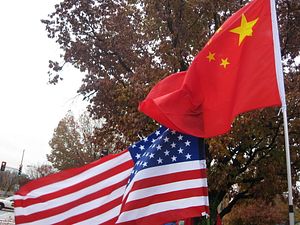On January 6, hundreds of protesters who had been at a rally of tens of thousands with then-President Donald Trump violently broke into the U.S. Capitol in Washington, D.C. Two died by violence, and three from medical emergencies. Since then, official Chinese media has been predictable in making false equivalencies between the U.S. incident and the storming of the Legislative Council (LegCo), Hong Kong’s legislature, on July 1, 2019.
Among the Chinese media outlets covering the event was the Global Times (GT). GT is a daily English-language tabloid newspaper under the management of the People’s Daily, the Chinese Communist Party’s (CCP) official Chinese-language mouthpiece. As such, in reading GT’s reporting as well as analysis, tone is as important as content. In the case of GT’s coverage of the January 6 incident, as well as its coverage since, which now includes the inauguration of Joe Biden as the United States’ 46th president, the tone is tinged with and often liberally swathed in messages of revenge, derision, mockery, and not-so-veiled threats.
In its January 7 article on the riot, GT quoted one Chinese netizen as saying, “Now, this ‘beautiful sight’ is taking place in the US. Pelosi can enjoy the beautiful sight – even at her office desk! For such a long time, US politicians called rioters ‘freedom fighters’ in other countries. Now, they finally have retribution!” (“Beautiful sight” is a term used by U.S. Speaker of the House Nancy Pelosi to describe Hong Kong demonstrators commemorating the June 4, 1989 massacre in and around Tiananmen Square in Beijing. It is often misappropriated to describe her feelings about LegCo’s sacking.)
Indeed, throughout the article, GT leveraged online comments which it claims were sourced from Chinese netizens and foreign observers to convey its message about the riot at the U.S. Capitol.
“Words like ‘Karma,’ ‘retribution,’ and ‘deserving’ were frequently mentioned in Chinese netizens’ comments when they saw the latest episode of the US’ real version of House of Cards,” the paper opined on January 7.
“It was like watching a thrilling action movie!” the paper reports one Chinese citizen saying online. The article continues, “Many Chinese netizens ‘confessed’ in their comments that they saw the ‘chaos in the US’ as revenge. After inciting so much chaos around the world under the pretext of ‘freedom and democracy,’ the US finally tasted the ‘karma’ of its double standards.”
The article also juxtaposes photographs of the takeover of LegCo with those of the storming of the U.S. Capitol. It goes on to point out that American officials made repeated statements of support for the Hong Kong protesters, while condemning those who rioted in its own Capitol.
In its coverage of Biden’s inauguration on January 20, GT attempts a more placatory tone at times, while wading into warnings and admonishments for the new administration, as well, a typical device of Chinese propaganda.
GT quotes Li Haidong, a professor at the Institute of International Relations of China Foreign Affairs University, as saying that “Biden’s team offered some tough words during the [confirmation] hearings, but they will be very pragmatic in reality, as they are experienced and know the boundaries and rules of the game with China.” He suggested that the Biden administration’s strategy toward China is “more manageable rather than outright confrontational.”
GT even flatters Biden. Lü Xiang of the Chinese Academy of Social Sciences in Beijing said that “Biden will have the final say on US policies toward China, and the expressions of his team members at this moment cannot fully represent Biden’s ideas. Biden will handle China-US relations based on his rich diplomatic experiences,” the paper reports.
But for America itself, the GT is scathing, saying that the Capitol riot “laid bare the profound weaknesses and failures of the US system.”
Correctly describing Trump’s policy toward China as a “whole-of-government approach” which tried everything “short of actual war to confront China,” GT reports Lü Xiang’s warning, perhaps with some eagerness.
“If the US continues to expend its political capital and economic resources on major power competitions, it will walk along the same path as the former Soviet Union [which disintegrated],” Lü said.
In its January 21 editorial on the prospects of the U.S.-China relationship under a Biden administration, GT commented it is “very important” to note that “all conflicts have been provoked by Washington. Beijing has merely been responding and making countermoves… China is absolutely a defender, instead of a provocateur, in the series of conflicts with the US.”
This is victimization language well-known in any age, under any U.S. administration, from official Chinese sources. The characterization holds true for Chinese nation-state relationships across the globe. Any problems in the relationship are the fault of the other guy.
Martyrdom usually magnifies itself with magnanimity. GT goes on in its inauguration article to suggest that despite the injustice of America’s provocations, “As long as there is even 1 percent possibility to improve bilateral ties, China will make 100 percent efforts to push it forward,” quoting yet another Chinese academic.
What the GT fails to acknowledge, and is certainly not inclined to admit, is that despite the “failures and weaknesses of the U.S. system,” the democratic process of that system snapped back immediately in America. In the U.S., the riot lasted four hours, and lawmakers returned to the Capitol in the evening to finish certifying Joe Biden’s election to the presidency. As of noon on January 20, a new president is in office. A document older than the telegraph and the steam locomotive, the U.S. Constitution, prevailed in making that happen.
In Hong Kong the polar opposite occurred, and democratic freedoms outlined in the Basic Law have been further curtailed by a National Security Law. Meanwhile, in mainland China itself, the democratic freedoms that the Chinese Communist Party caustically criticizes America for having failed to live up to have yet to be born at all.

































